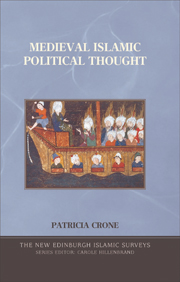Book contents
- Frontmatter
- Contents
- List of charts
- Preface
- Addenda and corrigenda
- I THE BEGINNINGS
- II THE WANING OF THE TRIBAL TRADITION, c. 700–900
- III COPING WITH A FRAGMENTED WORLD
- IV GOVERNMENT AND SOCIETY
- 17 THE NATURE OF GOVERNMENT
- 18 THE FUNCTIONS OF GOVERNMENT
- 19 VISIONS OF FREEDOM
- 20 THE SOCIAL ORDER
- 21 MUSLIMS AND NON-MUSLIMS
- 22 EPILOGUE: RELIGION, GOVERNMENT, AND SOCIETY REVISITED
- Charts
- Bibliography, abbreviations, and conventions
- Index and glossary
21 - MUSLIMS AND NON-MUSLIMS
from IV - GOVERNMENT AND SOCIETY
Published online by Cambridge University Press: 05 August 2013
- Frontmatter
- Contents
- List of charts
- Preface
- Addenda and corrigenda
- I THE BEGINNINGS
- II THE WANING OF THE TRIBAL TRADITION, c. 700–900
- III COPING WITH A FRAGMENTED WORLD
- IV GOVERNMENT AND SOCIETY
- 17 THE NATURE OF GOVERNMENT
- 18 THE FUNCTIONS OF GOVERNMENT
- 19 VISIONS OF FREEDOM
- 20 THE SOCIAL ORDER
- 21 MUSLIMS AND NON-MUSLIMS
- 22 EPILOGUE: RELIGION, GOVERNMENT, AND SOCIETY REVISITED
- Charts
- Bibliography, abbreviations, and conventions
- Index and glossary
Summary
INFIDELS
Human beings were divided into Muslims and infidels (kuffār, sing. kāfir). A Muslim was someone who surrendered to God and lived as His servant (abd allāh, pl. ibād allāh) in a society based on His law. Infidels were rebels against God whose societies could never be more than the robbers’ nests with which St Augustine had compared kingdoms devoid of justice. Since they did not live by God's law, nothing they did had any moral basis. Relationships established by them were not legally valid, compacts made with them did not have to be honoured, they themselves could be freely killed, “like wild animals before the arrows and spears”, as a famous thirteenth-century poet put it; their property could be taken as booty, and “all their wives and children are free spoil”, as the poet said, meaning that they could be taken as slaves. Bereft of divine guidance, infidels were not what we would call truly human.
Some infidels came closer to true humanity than others. Unlike pagans, indiscriminately known as polytheists (mushrikūn) and idolaters (abadat alawthān), the Jews and the Christians had received revelations from God, the Pentateuch (al-tawrāt) in the case of the Jews, the Gospels (al-injīl) in that of the Christians. They were ahl al-kitāb, People of the Book. But they were still infidels, for they denied that Muḥammad had brought a new revelation from God, and they had perverted their scriptures and their original faith: their monotheism was no longer pure. Those of them who had not been brought under Muslim sovereignty were outlaws on a par with the pagans.
- Type
- Chapter
- Information
- Medieval Islamic Political Thought , pp. 358 - 392Publisher: Edinburgh University PressPrint publication year: 2004



